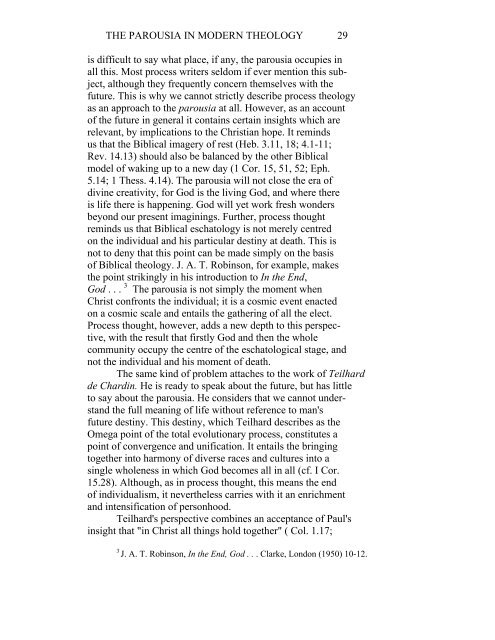the parousia in modern theology: some questions ... - Tyndale House
the parousia in modern theology: some questions ... - Tyndale House
the parousia in modern theology: some questions ... - Tyndale House
You also want an ePaper? Increase the reach of your titles
YUMPU automatically turns print PDFs into web optimized ePapers that Google loves.
THE PAROUSIA IN MODERN THEOLOGY 29<br />
is difficult to say what place, if any, <strong>the</strong> <strong>parousia</strong> occupies <strong>in</strong><br />
all this. Most process writers seldom if ever mention this sub-<br />
ject, although <strong>the</strong>y frequently concern <strong>the</strong>mselves with <strong>the</strong><br />
future. This is why we cannot strictly describe process <strong>the</strong>ology<br />
as an approach to <strong>the</strong> <strong>parousia</strong> at all. However, as an account<br />
of <strong>the</strong> future <strong>in</strong> general it conta<strong>in</strong>s certa<strong>in</strong> <strong>in</strong>sights which are<br />
relevant, by implications to <strong>the</strong> Christian hope. It rem<strong>in</strong>ds<br />
us that <strong>the</strong> Biblical imagery of rest (Heb. 3.11, 18; 4.1-11;<br />
Rev. 14.13) should also be balanced by <strong>the</strong> o<strong>the</strong>r Biblical<br />
model of wak<strong>in</strong>g up to a new day (1 Cor. 15, 51, 52; Eph.<br />
5.14; 1 Thess. 4.14). The <strong>parousia</strong> will not close <strong>the</strong> era of<br />
div<strong>in</strong>e creativity, for God is <strong>the</strong> liv<strong>in</strong>g God, and where <strong>the</strong>re<br />
is life <strong>the</strong>re is happen<strong>in</strong>g. God will yet work fresh wonders<br />
beyond our present imag<strong>in</strong><strong>in</strong>gs. Fur<strong>the</strong>r, process thought<br />
rem<strong>in</strong>ds us that Biblical eschatology is not merely centred<br />
on <strong>the</strong> <strong>in</strong>dividual and his particular dest<strong>in</strong>y at death. This is<br />
not to deny that this po<strong>in</strong>t can be made simply on <strong>the</strong> basis<br />
of Biblical <strong>the</strong>ology. J. A. T. Rob<strong>in</strong>son, for example, makes<br />
<strong>the</strong> po<strong>in</strong>t strik<strong>in</strong>gly <strong>in</strong> his <strong>in</strong>troduction to In <strong>the</strong> End,<br />
God . . . 3 The <strong>parousia</strong> is not simply <strong>the</strong> moment when<br />
Christ confronts <strong>the</strong> <strong>in</strong>dividual; it is a cosmic event enacted<br />
on a cosmic scale and entails <strong>the</strong> ga<strong>the</strong>r<strong>in</strong>g of all <strong>the</strong> elect.<br />
Process thought, however, adds a new depth to this perspec-<br />
tive, with <strong>the</strong> result that firstly God and <strong>the</strong>n <strong>the</strong> whole<br />
community occupy <strong>the</strong> centre of <strong>the</strong> eschatological stage, and<br />
not <strong>the</strong> <strong>in</strong>dividual and his moment of death.<br />
The same k<strong>in</strong>d of problem attaches to <strong>the</strong> work of Teilhard<br />
de Chard<strong>in</strong>. He is ready to speak about <strong>the</strong> future, but has little<br />
to say about <strong>the</strong> <strong>parousia</strong>. He considers that we cannot under-<br />
stand <strong>the</strong> full mean<strong>in</strong>g of life without reference to man's<br />
future dest<strong>in</strong>y. This dest<strong>in</strong>y, which Teilhard describes as <strong>the</strong><br />
Omega po<strong>in</strong>t of <strong>the</strong> total evolutionary process, constitutes a<br />
po<strong>in</strong>t of convergence and unification. It entails <strong>the</strong> br<strong>in</strong>g<strong>in</strong>g<br />
toge<strong>the</strong>r <strong>in</strong>to harmony of diverse races and cultures <strong>in</strong>to a<br />
s<strong>in</strong>gle wholeness <strong>in</strong> which God becomes all <strong>in</strong> all (cf. I Cor.<br />
15.28). Although, as <strong>in</strong> process thought, this means <strong>the</strong> end<br />
of <strong>in</strong>dividualism, it never<strong>the</strong>less carries with it an enrichment<br />
and <strong>in</strong>tensification of personhood.<br />
Teilhard's perspective comb<strong>in</strong>es an acceptance of Paul's<br />
<strong>in</strong>sight that "<strong>in</strong> Christ all th<strong>in</strong>gs hold toge<strong>the</strong>r" ( Col. 1.17;<br />
3 J. A. T. Rob<strong>in</strong>son, In <strong>the</strong> End, God . . . Clarke, London (1950) 10-12.

















